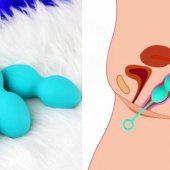A vaginal yeast infection is mostly caused by Candida albicans. Candida albicans is the name of the yeast and is often considered as a fungus. Candida albicans lives naturally in the vagina.Together with bacteria Candida maintains of the natural balance in the vagina.
Under certain circumstances, this balance can get disrupted. The fungus can start to grow excessively and an infection occurs. A few examples of this are repeatedly rinsing or washing of the vagina with soap, hormonal fluctuations, use of antibiotics, tension and stress.
If you have diabetes or a decreased immunity, you have a higher risk of developing a vaginal infection. If Candida causes infection, it can manifest in the vagina as well as on the labia.
Symptoms of vaginal candidiasis are: itching in and around the vagina, a burning pain in and around the vagina, pain during urination or intercourse, plenty of white and flakey vaginal discharge, redness and swelling of the vaginal wall and labia.
Usually, there are vague complaints. A vaginal yeast infection sometimes doesn't produce any symptoms, so treatment is not required in such cases. In many cases, your general practitioner can make the diagnosis based on your complaints and external features.
If complaints point towards a vaginal yeast infection, your general practitioner can perform an internal examination. A little bit of vaginal discharge is then removed from the vagina for further investigation.
Candida albicans can be identified under a microscope. A vaginal yeast infection can be treated well and easily with medication. Vaginal candidiasis can be treated with medicines that kill fungi. Your doctor can select local treatment such as a vaginal pill or a cream for internal use. Also, your practitioner can prescribe oral treatments such as an oral pill.
The complaints of a vaginal yeast infection usually disappear after two to three days of treatment. It is advisable to avoid sexual intercourse until the complaints have vanished. Your partner only needs to be treated if he also has any complaints. Your general practitioner can give you more information about candidiasis and the possible treatments.
- 6595 views













